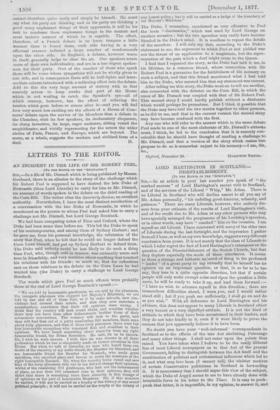LETTERS TO THE EDITOR.
AN INCIDENT IN THE LIFE OF SIR ROBERT PEEL.
(TO THE EDITOR OF THE "SPECTATOR.']
SI11,—In a life of Mr. Disraeli which is being published by Messrs. Goubaud, there is an allusion to the story of the challenge which Sir Robert Peel is supposed to have desired the late Duke of Newcastle (then Lord Lincoln) to carry for him to Mr. Disraeli, on account of words spoken in the debate on the third reading of the Corn Bill. The writer cites the Quarterly Review, an excellent authority. Nevertheless, I have the most distinct recollection of a conversation with the late Duke of Newcastle, in which he mentioned as the person to whom Peel had asked him to carry a challenge not Mr. Disraeli, but Lord George Bentinck.
We had been comparing notes of Eton and Oxford, where the Duke had been some time before me. This led the Duke to speak of his contemporaries, and among them of Sydney Herbert ; and he gave me, from his personal knowledge, the refutation of the story that Peel, when he felt that he could no longer defend the Corn Laws himself, had put up Sydney Herbert to defend them. The Duke said nobody could be less likely to do such a thing than Peel, who, though cold in manner, was eminently warm and true in friendship, and very sensitive about anything that touched his relations with his friends ; so much so, that for reflections east on those relations in the debate on the Corn Laws he had wanted him (the Duke) to carry a challenge to Lord George Bentinck.
The words which gave Peel so much offence were probably those at the end of Lord George Bentinck's speech :—
" Wo are told by honourable gentlemen, we are told by the pluemon, tho renegade placemen who support hor Majesty's Ministers, we are told by one and all of them that, as if by some miracle, new con- victions had crossed their minds, and that they now entertain a conscientious conviction that their old opinions were wrong. I think that the country will look round about, and consider whether there may not have been other inducements besides those of their miraculous conversions. The country will look to the party, and they will find that out of a party numbering 352 members, there were about forty placemen, and that of those forty placemen there were but four honourable exceptions who remained firm and steadfast in their opinions. We have heard something about sincerity from my right honourable friend, the Home Secretary. He said, let us be sincere. Sir, I wish he were sincere. I wish that he was sincere in all those professions which he has so eloquently made on former occasions in this House. But when we talk of sincerity, no man who heard them can doubt of the sincerity of my noble friend, the Member for Stamford, and my honourable friend the Member for Wenloek, who made great sacrifices, who sacrified place and favour to resist the measures of the right honourable Baronet. Sir, when the country looks round and sees that of the forty placemen only one in ten did not change thoir opinions, whilst of the remaining 312 gentlemen, who had not the inducements of place, no less than 240 remained true to their opinions, they will think that there is something more than sincerity in this change of of opinions on the part of honourable Members. Sir, if this measure be carried, it will not be carried as a trophy of the victory of any sound political principle ; it will not be carried as the trophy of the victory of
any honest policy ; but it will be carried as a badge of the treachery of her Majesty's Ministers."
The Duke, I remember, mentioned as very offensive to Peet the term "Janissaries," which was used by Lord George on. another occasion ; but the two speeches may easily have become blended in the Duke's mind. It is needless to repeat the details of the anecdote. I will only say that, according to the Duke's. statement to me, the argument to which Peel at last yielded was not the threat of an application to a magistrate, but the repre- sentation of the pain which a duel might cause to the Queen.
I find that I repeated the story, as the Duke had told it me, in his lifetime, to a common friend, whose connection with Sir Robert Peel is a guarantee for the faithfulness of his memory oi. such a subject, and that this friend mentioned what I had told him to the Duke, who assured him that my statement was correct.
After telling me this story, the Duke went on to tell me another, also connected with the debates on the Corn Bill, in which the name of Mr. Disraeli was coupled with that of Sir Robert Peel. This second story I could hardly publish without a disclosure which would perhaps be premature. But I think it possible that the Duke may have told the two stories together to other persons,. as he did to me, and that in the current version the second story may have become confused with the first.
Any one who will refer to the answer which in the same debate- Peel made to one of the most elaborate of Mr. Disraeli's atttacks must, I think, be led to the conclusion that it is scarcely con- ceivable that he should have thought of sending a challenge to Mr. Disraeli, and that a version of the story which makes him. propose to do so is somewhat unjust to his memory.—I am, Sir,.






































 Previous page
Previous page